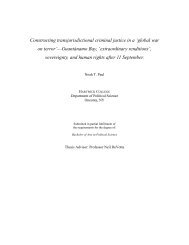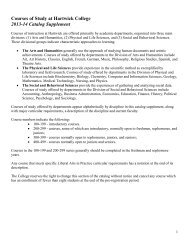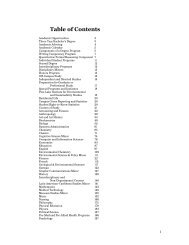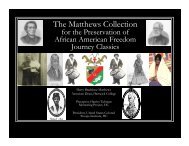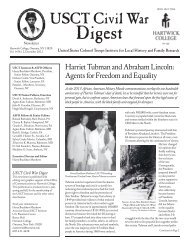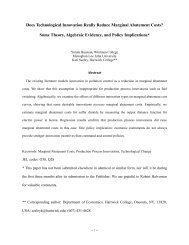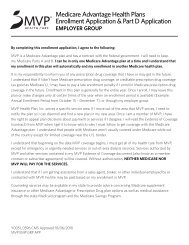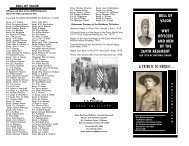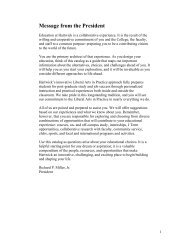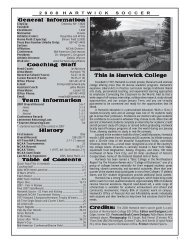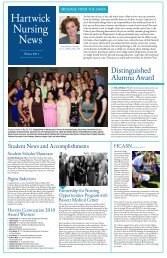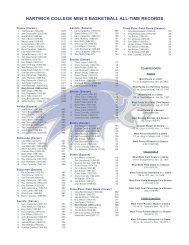Table of Contents - Hartwick College
Table of Contents - Hartwick College
Table of Contents - Hartwick College
Create successful ePaper yourself
Turn your PDF publications into a flip-book with our unique Google optimized e-Paper software.
Special Programs and Institutes<br />
In addition to its regular academic programs for undergraduate students,<br />
<strong>Hartwick</strong> <strong>of</strong>fers a number <strong>of</strong> special opportunities for other<br />
constituencies. Many <strong>of</strong> these take place in the summer, when the campus<br />
is a busy place with a variety <strong>of</strong> camps, workshops and conferences, the<br />
largest <strong>of</strong> which is the <strong>Hartwick</strong> <strong>College</strong> Summer Music Festival<br />
and Institute, now in its 59th year.<br />
The <strong>Hartwick</strong> Humanities in Management Institute is a research<br />
and educational foundation headquartered at <strong>Hartwick</strong> <strong>College</strong>. Its<br />
purpose is to encourage and support the study <strong>of</strong> the great literary,<br />
philosophical, biographical and dramatic works in terms <strong>of</strong> their practical<br />
value to managers in corporate, institutional, pr<strong>of</strong>it and not-for-pr<strong>of</strong>it<br />
settings. The Institute conducts management training seminars around<br />
the country and holds forums that bring together scholars and managers<br />
for mutually beneficial interchange. <strong>Hartwick</strong> students are heavily<br />
involved in the daily running <strong>of</strong> the Institute.<br />
The Institute for Ancient Equestrian Studies is located in the<br />
anthropology department in Yager Hall. The IAES is a research<br />
foundation dedicated to exploring the links between horses and early<br />
human history. The IAES conducts archaeological excavations in the<br />
steppes <strong>of</strong> Russia to investigate the origins <strong>of</strong> horseback riding and the<br />
development <strong>of</strong> early horse-riding societies in the steppe grasslands <strong>of</strong><br />
Eurasia. It also advises museums and other educational organizations.<br />
<strong>Hartwick</strong> students helped to design the IAES Web page and have<br />
participated in archaeological excavations at Bronze Age burial mounds<br />
and settlements in Russia.<br />
Academic Calendar<br />
<strong>Hartwick</strong>’s academic calendar provides a structure for the academic year<br />
designed to help students get the most out <strong>of</strong> their college experiences. In<br />
the Fall and Spring terms, students take 12-16 credits and have periods set<br />
aside as Reading and Examination Days to conclude their studies. During<br />
the one-month January Term, students choose one course from among a<br />
wide variety <strong>of</strong> special opportunities, including advanced independent<br />
study in their majors, <strong>of</strong>f-campus study programs, internships, or courses<br />
especially designed for intensive study, held both on and <strong>of</strong>f campus.<br />
January Term and the Annual Theme<br />
January Term at <strong>Hartwick</strong> is designed to be very different from fall and<br />
spring semesters. One important difference is that students enroll in a<br />
single course for the entire four-week term, usually for several hours each<br />
day. This allows for a concentrated, intensive examination <strong>of</strong> subjects<br />
<strong>of</strong>ten not taught during a longer semester. Whether taking a course or<br />
independent study on campus or an <strong>of</strong>f-campus program or internship,<br />
students are able to invest themselves completely in just one course with<br />
no distractions.<br />
17



